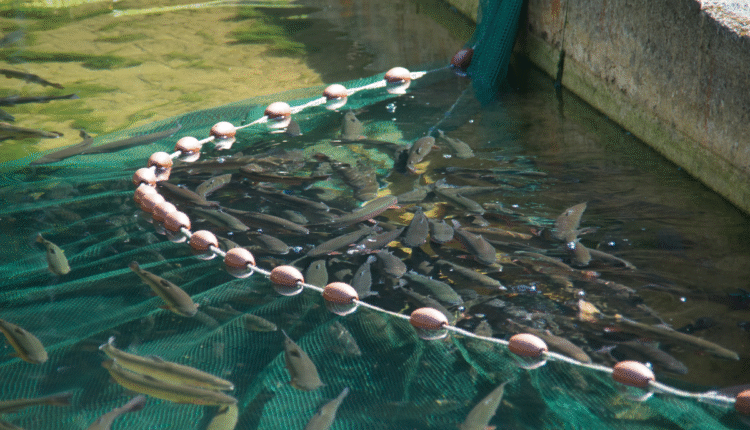Fish Farming: Hema Dangwal became the new hope of fish farming in the mountains, an example of self-reliance
Fish Farming: Hema Dangwal, a resident of Sunkiya village in Nainital district of Uttarakhand, did what is usually considered difficult in the mountains – establishing fish farming as a successful business. While on the one hand the mountain villages are struggling with migration and unemployment, Hema Dangwal, with the help of local resources and government schemes, not only connected herself but many women with employment.
Started moving beyond traditional thinking
The life of women in the mountains is difficult – farming, animal husbandry, household work and lack of resources. Hema Dangwal also grew up in the same circumstances. But she did not limit herself to only household tasks. When some women of the village told her that they also wanted to do something new, Hema Dangwal sat with them and thought and then decided to try fish farming.
Training and technical information changed the picture
Hema Dangwal took proper training in fish farming from the fisheries training center located in Bhimtal. During this, she learned what kind of fish can be reared in hilly areas, how to make a pond, how to maintain the quality of water and how to prepare food for the fish.
Some key learning points:
Plastic lining is necessary for fish ponds, especially in areas with sandy soil
Selection of fish breed according to temperature and altitude
Techniques to maintain oxygen and water quality
Measures to identify and prevent diseases
Construction of Ponds for Fish Farming: From challenge to opportunity
The land in Hema Dangwal’s village was sandy, where water did not stay. But she did not give up. Under the government scheme, she got a pond with plastic lining constructed, due to which water started staying. The pond was constructed for about Rs 25 thousand, out of which 60% of the cost was given by the government as subsidy.
Today she has 2 ponds in which she is rearing fish like silver carp, common carp, crucian carp and golden fish. Out of these, the demand for golden fish is high in the aquarium market, due to which she gets good profits.
Feeding and care process of Fish
For the food of fish, Hema Dangwal prepares a mixture of rice, wheat flour and husk at home. Apart from this, she also brings readymade protein-rich feed from the market. She believes that good food and clean water are the keys to the success of fish farming.
To maintain the quality of water:
Regular water testing
Oxygen circulation from pump system
Periodical cleaning of the pond
Production, cost and profits
Hema Dangwal says that 3 to 4 quintals of fish are produced annually from a pond. The price of fish in the market is Rs 300 to Rs 500 per kg. That is, in a season she earns Rs 1 to 1.5 lakh. Out of this, the net profit is about 50-60%. He told that in the beginning, fish farming can be started by making a small pond for 10-15 thousand rupees. As the experience increases, the investment can also be increased.
A new path was created by connecting women
Hema Dangwal also involved other women of the village in this work. She formed a Self Help Group (SHG) in which women together prepare ponds, buy seeds and rear fish. By taking loan from the bank and subsidy from the government, many women of the village have now become self-reliant.
Benefits of the group:
Group training
Better prices in the market
Access to financial assistance and schemes
Strength gained from Government Schemes
Hema Dangwal got full benefit of the schemes of the Fisheries Department. She took advantage of schemes like PM Matsya Sampada Yojana, Revolving Fund, and subsidy on pond construction. Along with this, guidance was also received from the officials of the Fisheries Department from time to time.
Honours and Recognition
Hema Dangwal’s efforts have been appreciated at the national and state level. She has been honoured in programs like ICAR Mukteshwar, Pusa Kisan Mela, and Biofest. Her experiences have now reached other districts as well and she also participates as a motivational speaker in many government training programs.
Future Plan
Hema Dangwal is now preparing to do fish farming with biofloc technology, which will make more production possible in less space. Along with this, she is also considering models like organic farming and aquaponics so that water and resources can be used optimally.
Conclusion
Hema Dangwal’s life is proof that fish farming is not limited to the plains only. With willpower, information and government support, it can become a successful business even in the mountains. Her story is not only an example of economic self-reliance, but is also a big step towards social change.
Contact details: If farmers want to share information or experiences related to farming with us, then they can do this by calling us on the phone number 9599273766 or by writing an email to [email protected] or by sending your recording. Through Kisan of India, we will convey your message to the people, because we believe that if the farmers are advanced then the country is happy.



